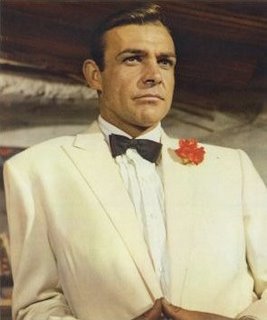 I’m an unrepentant James Bond fan.
I’m an unrepentant James Bond fan. Yes, the movies are sexist and exploitive--frozen in the hardened amber of 60’s attitudes and prejudices.
They’re filled with mink-lined sadism, clueless Brit' snobbery and snarky humor only drunken Frat boys laugh at.
I love it. And “Goldfinger” (1964) is the epitome of it all.
Call it a “guilty pleasure” if you must and place it at the end of this list, but homage must be paid and credit given.
There may be better films in the series (that would be its predecessor, the slightly more sober “From Russia With Love”- and I have warm spots in my heart for OHMSS, the nasty/silly “Diamonds Are Forever,” and “The Living Daylights.”) Certainly there are more elaborate and flashy ones, where you walk out talking about the sets (and not much else).
But “Goldfinger” has it all, managing to take a middling Fleming thriller (even though Anthony Burgess listed it in his “99 Novels: The Best in English Since 1939 ” as a representative of the Bond series) and improve on it—a rarity in the films. The screenplay (by series veteran Richard Maibaum and utility closer Paul Dehn) is an efficient series of traps and foreshadows-dropping gold nuggets of information that pay off later in the story: Bond’s improvised electrocution of an assailant in a seemingly-unrelated pre-titles sequence sets us up with information for another situation later, as does a casual conversation about discharging firearms in a pressurized airplane cabin (since disproved by the “Mythbusters”) Maibaum and Dehn toss out a group of characters early (and fittingly) to streamline the Big Set-Piece-Goldfinger’s raid on Ft. Knox, and go Fleming one better—instead of the unworkable book idea of physically stealing the gold, the screenwriters just devise a way to irradiate it, making it unexploitable, crashing the U.S. economy while increasing the worth of the villain’s holdings. Neat. They also update the book’s nasty “Perils of Pauline” sequence with a circular saw by strapping Bond to a slab of gold being bisected by the recently-developed laser beam.
Maibaum excelled at plot and structure, but it was Dehn, a radicalized gay writer who had worked as a propaganda instructor at the OSS "Camp X" during WWII, who tossed in the more cheeky touches. There’s a cool re-appraisal of Bond as a hero in this film. He’s basically kicked between situations out of his control, something which irked star Sean Connery who saw Bond as an active investigator. Connery was also miffed at some Bond set-ups—the seagull disguise at the very beginning of the film, although he did embrace Bond stripping off a wet-suit to reveal a white linen tuxedo jacket, which he wears to a seedy South-of-the-Border bar (The “cluelessly-overdressed Bond” joke would be done to death in the films until Timothy Dalton put an end to it --although Pierce Brosnan still had his Bond pathologically straighten his tie, even underwater).
His third time out Connery is finally casual with Bond, while tossing in odd little bits of business to suggest that Bond is inches away from being clobbered on a regular basis. The villains are memorable, and the women have defined personalities (for once) with Shirley Eaton’s “golden girl” displaying as much aggressive sexuality as Bond (Eaton, and Gert Frobe, as Goldfinger, had their vocal parts dubbed by other actors). Of course, there's also the "homer," the lethal bowler hat, the hi-tech exoticism of the laser beam. And then, there’s the car.
John Barry’s score is the blaring frosting on the cake: repeating chimes announcing the presence of the villain, or anything having to do with gold; sinuous strings compounding like snakes creep during the laser beam sequence and Goldfinger’s signature theme blats out in brass clusters. And although other artists’ Bond songs have topped the charts, no one’s topped its theme song (with lyrics by Leslie Bricusse and Anthony Newley) for brio and outrageousness. No one has ever “belted” a song like Shirley Bassey does this.
It also has my two favorite lines from any Bond film. The first, adapted from Fleming:
This is gold, Mr. Bond. All my life I’ve been in love with its color, its brilliance, its divine heaviness.
And from Maibaum and Dehn, a line so good, it’s amazing no thriller had used it yet:
Bond: Do you expect me to talk?
Goldfinger: No, Mr. Bond, I expect you to DIE!
They’ve just finished filming the latest James Bond film—which is based on Fleming’s first Bond novel “Casino Royale” but due to rights issues has been out of the grasp of the longtime Bond producers. The new Bond is an odd choice—Daniel Craig, who suggests (when he’s “on”) a British Steve McQueen. He has been bad in some films (“Lara Croft: Tomb Raider” and “Road to Perdition”) where he barely registers, but he CAN be the thing your eyes gravitate to, as in Spielberg’s “Munich” or the British TV version of “Copenhagen” (Craig played Heisenberg), or his signature film “Layer Cake.” He may be a bit different, but he can’t be THAT different. After all, every film has ended with “James Bond will Return.” It’s a bit like saying “Meet the new Bond. Same as the old Bond.”
"Anytime Movies" are movies I can watch anytime, anywhere. If I see a second of it, I can identify it. If it shows up on television, my attention is focused on it until the conclusion. Sometimes it’s the direction, sometimes it’s the writing, sometimes it’s the acting, sometimes it’s just the idea behind it, but these are the movies I can watch again and again and never tire of them. There are ten. This is Number 10.
X: Goldfinger
No comments:
Post a Comment